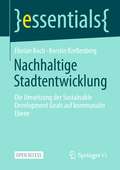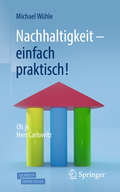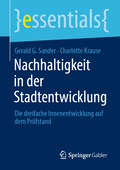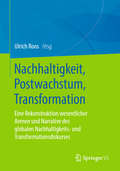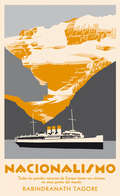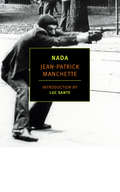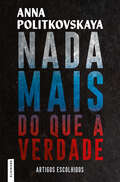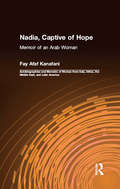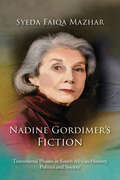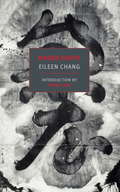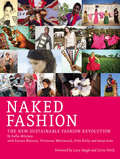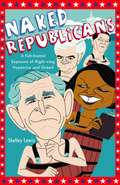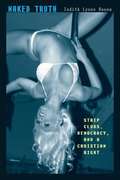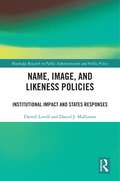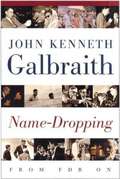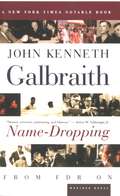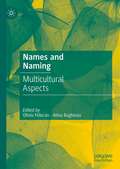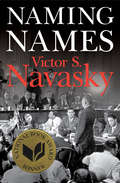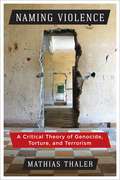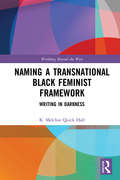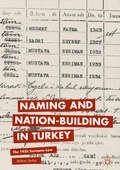- Table View
- List View
Nachhaltige Stadtentwicklung: Die Umsetzung der Sustainable Development Goals auf kommunaler Ebene (essentials)
by Kerstin Krellenberg Florian KochDieses Open Access Buch thematisiert den Beitrag der Städte zur nachhaltigen Entwicklung. Die Autor*innen stellen die Agenda 2030 und die 17 Sustainable Development Goals (SDGs) vor, auf die sich die Mitgliedstaaten der Vereinten Nationen im Jahr 2015 einigten. Sie zeigen auf, wie die Ziele kommunal umgesetzt werden und welche Herausforderungen sich dabei ergeben. Ansätze nachhaltiger Stadtentwicklung werden vorgestellt und nationale sowie internationale Beispiele verdeutlichen die Lokalisierung der SDGs. Dies wird ergänzt durch Forschungsansätze zur Unterstützung von Nachhaltigkeitstransformationen in gemeinsamer Arbeit von Wissenschaft und Praxis.
Nachhaltigkeit – einfach praktisch!: Oh je, Herr Carlowitz
by Michael WühleWas bedeutet Nachhaltigkeit für Sie? Nachhaltigkeit ist nicht nur ein Begriff mit einer Fülle von Bedeutungen und vielen möglichen Missdeutungen. Nachhaltigkeit kann auch ein effektives Werkzeug sein, um unser praktisches Handeln zu leiten und komplizierte Entscheidungen zu vereinfachen. Mit Nachhaltigkeit lassen sich Kosten sparen und jede Organisation sowie jedes Unternehmen stabilisieren. Sie schont das Klima und die Umwelt und führt alle Menschen in eine gute Zukunft. Das Sachbuch „Nachhaltigkeit – einfach praktisch!“ ist ein Leitfaden für Menschen, die vor nachhaltigen Entscheidungen stehen und die Zukunft aktiv mitgestalten wollen – sei es im beruflichen Leben oder im privaten und ehrenamtlichen Engagement.Das Buch verschafft nicht nur dem interessierten Laien eine umfassende Übersicht über die zentralen Aspekte des Nachhaltigkeitsmanagements, es bietet auch dem Praktiker wichtige Entscheidungshilfen für ein verstärktes Engagement.
Nachhaltigkeit in der Stadtentwicklung: Die dreifache Innenentwicklung auf dem Prüfstand (essentials)
by Gerald G. Sander Charlotte KrauseDieses essential zeigt, wie das Konzept der dreifachen Innenentwicklung zu einer nachhaltigen Stadtentwicklung und zur Verbesserung der urbanen Lebensqualität beitragen kann. Städte und Kommunen stehen vor großen Herausforderungen wie Flächenknappheit, Umweltbelastungen und der Notwendigkeit einer integrierten Verkehrsplanung. Vor diesem Hintergrund wird das 2023 veröffentlichte Konzept der dreifachen Innenentwicklung daraufhin untersucht, ob es den Anforderungen an eine nachhaltige Stadtentwicklung gerecht wird. Darüber hinaus analysieren die Autoren die drei zentralen Handlungsfelder – Flächennutzung, Stadtgrün und Mobilität – und stellen rechtlich fundierte Ansätze zur Ressourcenschonung und Transformation des urbanen Raums vor. Das Buch liefert Impulse für alle, die eine ganzheitlich ausgerichtete Stadtentwicklung vorantreiben und die Städte von morgen aktiv mitgestalten wollen.
Nachhaltigkeit messbar machen: Ein Praxisbuch für nachhaltiges Leben und Arbeiten
by Michael WühleEtwas messbar zu machen, bedeutet es steuern zu könnenNachhaltigkeit ist ein Begriff mit einer Fülle von Bedeutungen und vielen möglichen Missdeutungen. Dabei kann Nachhaltigkeit ein mächtiges und effektives Werkzeug sein, um unser praktisches Handeln zu leiten und komplizierte Entscheidungen zu vereinfachen.Mit Nachhaltigkeit lassen sich Kosten sparen und jede Organisation sowie jedes Unternehmen stabilisieren. Sie schont das Klima und die Umwelt und führt alle Menschen in eine gute Zukunft.Das Sachbuch „Nachhaltigkeit messbar machen“ ist ein praxisnaher Leitfaden, wie Methoden und Instrumente der Nachhaltigkeit erfolgreich eingesetzt werden können – sei es im beruflichen Leben oder im privaten und ehrenamtlichen Engagement.Das Buch verschafft nicht nur dem interessierten Laien eine umfassende Übersicht über die zentralen Aspekte des Nachhaltigkeitsmanagements, es bietet auch dem Praktiker wichtige Entscheidungshilfen und Tipps zur Umsetzung. Der leicht verständliche Stil vermittelt auch Neueinsteigern alle wesentlichen Inhalte der Thematik der Nachhaltigkeit. Ob Vorkenntnisse oder nicht - mit den vielen sofort umsetzbaren „Best-Practices“ bietet das Buch eine Menge praktische Anwendungsmöglichkeiten. Die Anhänge enthalten uneingeschränkt nutzbare Tools aus der Praxis des Autors für die Einführung eines erfolgreichen Nachhaltigkeitsmanagements.
Nachhaltigkeit, Postwachstum, Transformation: Eine Rekonstruktion wesentlicher Arenen und Narrative des globalen Nachhaltigkeits- und Transformationsdiskurses
by Ulrich RoosDer Band versammelt zentrale Befunde abgeschlossener Forschungsarbeiten zur Frage der Entwicklung des globalen Nachhaltigkeitsdiskurses. Welche Narrative, Strategien, Ziele und Werte bestimmen den Kampf um Definition und Ausgestaltung nachhaltiger Politik? Welche Transformationsprozesse sind erkennbar, werden initiiert, gefordert oder bekämpft? Und welche Bedeutung kommt hierbei wirtschaftswissenschaftlichen Konzepten zu Wirkung und Relevanz von Wirtschaftswachstum sowie den hieran geäußerten Kritiken zu?Um diese Fragen zu beantworten, werden verschiedene Arenen des deutschsprachigen Nachhaltigkeitsdiskurses – Arbeit, Bildung, „Entwicklung“, Ethik, Transformation – detailliert rekonstruiert, um auf Grundlage der daraus resultierenden Gesamtschau des ökologisch-ökonomisch-politischen Systems die gegenwärtig hegemonialen Handlungsregeln und -logiken zu erkennen und kritisch zu reflektieren.
Nachrichtendienste in der Weltgesellschaft: Systemtheoretische Perspektiven (Horizonte der Internationalen Beziehungen)
by Jan HelmigNachrichtendienstforschung ist, vor allem in Deutschland, häufig stark geschichts- oder praxisorientiert ausgerichtet. Gesellschaftstheoretische Arbeiten zu Nachrichtendiensten sind Mangelware. Das Buch adressiert diese Lücke unter Rückgriff auf systemtheoretische Herangehensweisen. Diese erlauben eine theoretisch fundierte Betrachtung grundlegender Inhalte von Nachrichtenwesen wie Geheimnissen, den Umgang mit Unsicherheit oder bestimmten nachrichtendienstlichen Funktionen für die Politik. Dadurch werden einerseits neue theoretische Perspektiven für die „Intelligence Studies“ eröffnet und andererseits der Anschluss an aktuelle Diskussionen der Internationalen Beziehungen und der Internationalen Politischen Soziologie ermöglicht.
Nacionalismo (Serie Great Ideas #Volumen 9)
by Rabindranath TagoreIdeas que han cambiado el mundo. A lo largo de la historia, algunos libros han cambiado el mundo. Han transformado la manera en que nos vemos a nosotros mismos y a los demás. Han inspirado el debate, la discordia, la guerra y la revolución. Han iluminado, indignado, provocado y consolado. Han enriquecido vidas, y también las han destruido. Taurus publica las obras de los grandes pensadores, pioneros, radicales y visionarios cuyas ideas sacudieron la civilización y nos impulsaron a ser quienes somos. Novelista, músico, poeta y dramaturgo, Tagore fue además un feroz oponente del gobierno británico en la India. En esta obra analiza el resurgimiento de Oriente y el desafío que esto plantea a la supremacía occidental, y hace un llamamiento a un futuro más allá del nacionalismo basado en la cooperación y la tolerancia racial. Comentarios sobre la colección Great Ideas:«De veras que la edición es primorosa y pocas veces contenido y continente pueden encontrarse mejor ensamblados y unidos. ¡Qué portadas! Para enmarcar. [...] Ante las Great Ideas, solo cabe quitarse el sombrero. ¡Chapeau!»ABC «Taurus propone un doble envite con este lanzamiento. Por un lado aumenta su compromiso con el ensayo; por otro, recupera el gusto por la estética. A los volúmenes se les ha proporcionado una portada delicada y cuidada (copian el original británico) que invita a la lectura.»La Razón «Un fenómeno editorial.»The Guardian «Aparte de los contenidos, en general muy bien elegidos, son tan bonitos que si los ven seguro que cae alguno.»El País «Ideas revolucionarias, crónicas de exploraciones, pensamientos radicales... vuelven a la vida en estas cuidadísimas ediciones, muy atractivas para nuevos lectores.»Mujer Hoy «Grandes ideas bien envueltas. De Cicerón a Darwin, esta colección entra por los ojos.»Rolling Stone «Original y bella iniciativa la emprendida por Taurus con su colección Great Ideas.»Cambio 16 «Hay libros inmortales, libros únicos que contienen pensamientos y reflexiones capaces de cambiar el mundo, tesoros en miniatura reagrupados en la colección Great Ideas.»Diario de León
Nada
by Jean-Patrick ManchetteThis tour de force political thriller, told in Manchette's signature noir style, follows a group of far left extremists in the throes of post-1968 disillusionment.The thrill of 1968 is long over, and the heavy fog of the 1970s has settled in. In Paris, however, the Nada gang—or groupuscule—still retains a militant attachment to its revolutionary dreams. Bringing together an anarchist orphaned by the Spanish Civil War, a Communist veteran of the French resistance, a frustrated high-school teacher of philosophy, a timid office worker, a terminal alcoholic, and one uncompromising young woman with a house in the country, Nada sets out to kidnap the American ambassador and issue a call to arms. What could possibly go wrong?
Nada Mais do que a Verdade: Artigos Escolhidos
by Anna PolitkóvskayaUm livro atual e inspirador: a recolha definitiva dos melhores artigos escritos por Anna Politovskaya. «O que importa é a informação, não o que se pensa sobre ela.» Foi este o lema que norteou o corajoso e clarividente trabalho jornalístico de Anna Politkovskaya na Novaya Gazeta, numa era em que, segundo a própria, a liberdade de expressão na Rússia se encontraem fase terminal e o medo na sociedade esteriliza qualquer forma de idealismo. Descrevendo a vida tal como a via, relatando factos e testemunhos denunciadores de uma desumanidade sistémica, Politkovskaya ajudou a compreender a paisagem da Rússia pós-soviética, a corrupção na Pirâmide do Poder de Putin e a guerra na Chechénia. Admirada por notáveis do mundo da cultura e da política e agraciada com inúmeros prémios internacionais, foi, contudo, considerada uma pária pelo Kremlin e perseguida por aqueles que a viam como perigosa opositora, até ao seu assassínio em 2006. Publicado postumamente, Nada Mais do Que a Verdade é a recolha fundamental e definitiva num único volume dos melhores artigos de Anna Politkovskaya, incluindo textos inéditos recuperados do seu computador pessoal. Um livro atual e esclarecedor, e uma homenagem a uma das figuras mais célebres e inspiradoras do jornalismo internacional. «Uma compilação cujos estilo e efeito são reminiscentes de O Arquipélago Gulag, de Aleksandr Soljenítsin.» The Independent «Anna Politkovskaya recusou-se a mentir; o seu assassínio foi um ataque perpetrado contra a literatura mundial.» Nadine Gordimer «Uma jornalista heroica.» The Guardian «Continuaremos a lê-la e a aprender com ela durante muitos anos.» Salman Rushdie «A sua morte constitui um grave crime contra o país, contra todos nós.» Mikhail Gorbachev
Nadia, Captive of Hope: Memoir of an Arab Woman (Foremother Legacies Ser.)
by Fay Afaf KanafaniA rare feminist perspective on a people and a culture in one of the most tumultuous regions in the world, Nadia, Captive of Hope is the autobiography of Fay Afaf Kanafani, an Arab Muslim woman born in Beirut in 1918.
Nadine Gordimer's Fiction: Transitional Phases in South African History, Politics and Society
by Syeda Faiqa MazharNadine Gordimer’s Fiction is a major study of the life and writings of Nadine Gordimer, a towering figure in the literary and cultural life of South Africa in the late 20th and early 21st centuries, recognised for her fiction through several prizes, most notably the 1991 Nobel Prize for Literature. It has the makings of a guide, taking the reader through the complexities in Gordimer’s life, literature, and society, backed by academic research (doctoral and postdoctoral) and informed by Dr. Mazhar’s study visit to South Africa, including a face-to-face interview with Gordimer. The reader gets a rich picture mediated by the author’s own intellectual journey from Pakistan – the country of her birth – and the United Kingdom. Dr. Mazhar maps the complexities of colonialism in South Africa and beyond in different forms, most notably in the legislated discrimination based on race/ethnicity, Apartheid (1948–1994). Covering the literary writings and political activism of Gordimer both during and after Apartheid, the book provides the reader with a detailed account of individual works of fiction, and vistas of critical thought and action that serve as their source and backdrop. Dr. Mazhar draws on the cultural theories of Homi Bhabha, especially on the notion of The Third Space, a fictional space/borderland between social and political polarisations, which allows for reflection, refinement, and re-action that is transformational and psychologically uplifting. She demonstrates that Gordimer takes her characters through such spaces, which allow for a transformational experience that leads to perspectives/realisations that were missing as a result of constraints that were externally imposed by law and tradition and interiorised as a survival mode. Dr. Mazhar concludes that Gordimer gracefully articulates her vision for a world free of complexities, which one must strive for. Although the book presents the academic analysis of Gordimer‘s fiction and the memoir as separate parts, there are organic connections between the two, which link the social ethos, political struggles, varied ideological perspectives, and ethnic and trans-ethnic identities from which Gordimer draws her subjects and their lives and depicts them through appropriate narrative techniques. Nadine Gordimer’s Fiction is a welcome addition to books on author studies, literary criticism, and South African culture and society. It offers excellent material for both academic and non-academic readers. The style of writing used in the book is clear and simple, yet powerful. This can help the reader to appreciate the enormous achievement of Gordimer, which has established her as a major literary figure in South Africa and beyond. Dr. Balasubramanyam Chandramohan PhD (Shef), FHEA, Senior Research Fellow, Institute of Commonwealth Studies, School of Advanced Study, University of London
Naked Earth
by Eileen Chang Perry LinkAn NYRB Classics OriginalSet in the early years of Mao's China, Naked Earth is the story of two earnest young people confronting the grim realities of revolutionary change. Liu Ch'üan and Su Nan meet in the countryside after volunteering to assist in the new land reform program. Eager to build a more just society, they are puzzled and shocked by the brutality, barely disguised corruption, and ruthless careerism they discover, but then quickly silenced by the barrage of propaganda and public criticism that is directed at anyone who appears to doubt a righteous cause. Joined together by the secret of their common dismay, they remain in touch when Liu departs to work on a newspaper in Peking, where Su Nan eventually also moves. Something like love begins to grow between them--but then a new round of purges sweeps through the revolutionary ranks.One of the greatest and most loved of modern Chinese writers, Eileen Chang illuminates the dark corners of the human existence with a style of disorienting beauty. Naked Earth, unavailable in English for more than fifty years, is a harrowing tale of perverted ideals, damaged souls, deepest loneliness, and terror.
Naked Edge: I-Team 4 (I-Team #4)
by Pamela ClareFans of Suzanne Brockmann, Maya Banks, Christy Reece, Julie Ann Walker and Cindy Gerard will adore Pamela Clare's expertly plotted romantic suspense series, which sets the pages alight with sizzling chemistry. For tension, thrills, romance and passion take a spin with the I-Team.The day Navajo journalist Katherine James met Gabriel Rossiter, the earth literally moved beneath her feet when he saved her from a rockslide. So she is crushed when she recognizes her rescuer among the law enforcement officers throwing her and her friends off Mesa Butte, land they consider sacred. Gabe swore he would never again lose himself to a woman. But the attraction he feels to Kat is undeniable. And, appalled by his orders, he's determined to get to the bottom of events at Mesa Butte. But asking questions can be dangerous - almost as dangerous as risking one's heart. Soon Kat and Gabe's passion for the truth - and each other - makes them targets for those who would do anything, even kill, to keep Native Americans off their sacred land...Sexy. Thrilling. Unputdownable. Take a wildly romantic ride with Pamela Clare's I-Team: Extreme Exposure, Hard Evidence, Unlawful Contact, Naked Edge, Breaking Point, Striking Distance.
Naked Fashion
by Safia Minney Lucy Siegle Livia FirthNaked Fashion invites you to join the movement of consumers, entrepreneurs, and creative professionals who are using their purchasing power, talents, and experience to make fashion more sustainable. Anyone with an active interest in fashion and where our clothes come from or looking for a career in fashion and the media will find inspiration and advice on how to make a difference. Designers and creatives from all over the world--including photographers, models, illustrators, actors, and journalists--talk about what they are doing differently to make fashion more sustainable: Emma Watson explains why fair trade fashion is so important to her. Summer Rayne Oakes describes how she took on the model agencies. Vivienne Westwood talks high-fashion without the high stakes for the planet. Inside you will find fair trade and environment, styling and modeling, up-cycling and "slow" fashion, how we can change the high street, an ethical brand directory, and stunning visuals throughout. Safia Minney is founder and CEO of fair trade and sustainable fashion label People Tree. She has turned a lifelong interest in environment, trade, and social justice issues into an award-winning social business. Minney is widely regarded as a leader in the fair trade movement and has been awarded Outstanding Social Entrepreneur by the World Economic Forum and an MBE for her work in fair trade and the fashion industry.
Naked Republicans: A Full-frontal Exposure of Right-wing Hypocrisy
by Shelley LewisNaked Republicans is the exposé you’ve been waiting for. From Cheney to Condi, from DeLay to the Dukester, from Newt to Rummy, these are the weasels, wackos, and wingnuts who turned the party of Lincoln into a five-kegger blowout. For the first time, in one hilarious roundup, Shelley Lewis reveals the naked truth about the fiscal conservatives who spend money like they print it themselves (oh, right–they do); the pious pols who regard the institution of marriage so highly they’ve moved on to their second and third wives; and the deceitful dissemblers who’ve earned a place in the Hall of Shame. In these troubled times, when you don’t know whether to laugh or cry, Naked Republians puts the hip back in hypocrisy and restores the fun to fundamentalism!
Naked Truth: Strip Clubs, Democracy, and a Christian Right
by Judith Lynne HannaAcross America, strip clubs have come under attack by a politically aggressive segment of the Christian Right. Using plausible-sounding but factually untrue arguments about the harmful effects of strip clubs on their communities, the Christian Right has stoked public outrage and incited local and state governments to impose onerous restrictions on the clubs with the intent of dismantling the exotic dance industry. But an even larger agenda is at work, according to Judith Lynne Hanna. In Naked Truth, she builds a convincing case that the attack on exotic dance is part of the activist Christian Right’s “grand design” to supplant constitutional democracy in America with a Bible-based theocracy. Hanna takes readers onstage, backstage, and into the community and courts to reveal the conflicts, charges, and realities that are playing out at the intersection of erotic fantasy, religion, politics, and law. She explains why exotic dance is a legitimate form of artistic communication and debunks the many myths and untruths that the Christian Right uses to fight strip clubs. Hanna also demonstrates that while the fight happens at the local level, it is part of a national campaign to regulate sexuality and punish those who do not adhere to Scripture-based moral values. Ultimately, she argues, the naked truth is that the separation of church and state is under siege and our civil liberties—free speech, women’s rights, and free enterprise—are at stake.
Name, Image, and Likeness Policies: Institutional Impact and States Responses (Routledge Research in Public Administration and Public Policy)
by Darrell Lovell Daniel MallinsonThis book examines the path that name, image, and likeness (NIL) has taken in the first years of the policy, how the expansion has led to differing approaches across state and universities, and how administrators in selected states are dealing with the rulemaking power they have. After an introduction contextualising how NIL policies have impacted the administrative approach at institutions, the remaining chapters focus on how NIL has altered the role of compliance offices and administrators tasked with monitoring academic and financial activity in athletic departments. Chapters leverage theories of policy diffusion and implementation to offer context on the topics from administrative and policy perspectives, whilst also examining how entrepreneurs are both using the policies to advance the status of the athletic arms of their institutions while dealing with these compliance struggles. The authors conclude with a discussion of an unsettled policy landscape and whether stricter guidelines are on the horizon. Name, Image, and Likeness Policies will appeal to both scholars studying sport and law, public policy, public administration, state politics, and governance, as well as readers seeking to better understand what impacts NIL is having on the college system, and students connected to major sports such as college football and basketball.
Name-Dropping: From F.D.R. On
by John Kenneth GalbraithJohn Kenneth Galbraith, the noted economist, joined Franklin Delano Roosevelt and the New Deal in 1934 and served that administration during World War II; in the crucial role of Deputy Head of the Office of Price Administration in charge of price control. His service to FDR and his relationship with Eleanor Roosevelt began a long involvement with the leaders who would define much of the course of the twentieth century: Truman, Stevenson, John F. and Jacqueline Kennedy, Nehru, Lyndon Johnson, and others at home and abroad. Drawing on a lifetime of access to many of the greatest public figures, Galbraith creates a rich and uniquely personal history of the century -- a history he helped to shape. We are invited to hear FDR on the Great Depression and World War II; Albert Speer, the Third Reich's architect and armaments minister, on the boorishness and incompetence of the Nazi leadership; John F. Kennedy, from youth to the presidency; Jacqueline Kennedy's shrewd judgments of the White House inner circle. In this clear-eyed, unsparing, and amusing look back at the world and the people he has known, Galbraith tells what these leaders did -- how they looked to him then and how they look to him now -- with unforgettable reminiscences and a rich infusion of engaging anecdotes. "Name-Dropping" charts the political landscape of the past sixty-five years with the dazzling insight, humor, and literary skill that mark Galbraith as one of the most distinguished writers of our time.
Name-Dropping: From FDR On (Letras De Crítica Ser.)
by John Kenneth Galbraith&“[A] charming memoir [that] serves to remind us that idealism and trust once existed in the White House and Washington, a fact that may seem unbelievable&” (Newsday). A New York Times Notable Book &“Names? You want names? No one knows better ones than John Kenneth Galbraith,&” says the San Diego Union-Tribune. Name-Dropping covers the long and remarkable career of this economist and former ambassador, charting sixty-five years of politics, government, and American history as he writes of the many people he has known—among them Franklin and Eleanor Roosevelt, Harry S. Truman, John F. Kennedy, Adlai Stevenson, and Jawaharlal Nehru—&“with a wit, style, and elegance few can match&” (Library Journal). This &“mischievously and merrily unrepentant&” memoir offers a rich and uniquely personal history of the twentieth century—a history the author himself helped to shape (The Boston Globe). &“Shrewd, irreverent, penetrating, and hilarious.&” —Arthur M. Schlesinger Jr. &“It is not usual for a man past his 90th birthday to write a book that is as fresh and lively as the work of a 30-year-old. But John Kenneth Galbraith is not a usual man, and he has done it.&” —The New York Times
Names and Naming: Multicultural Aspects
by Oliviu Felecan Alina BugheșiuThis edited book examines names and naming policies, trends and practices in a variety of multicultural contexts across America, Europe, Africa and Asia. In the first part of the book, the authors take theoretical and practical approaches to the study of names and naming in these settings, exploring legal, societal, political and other factors. In the second part of the book, the authors explore ways in which names mirror and contribute to the construction of identity in areas defined by multiculturalism. The book takes an interdisciplinary approach to onomastics, and it will be of interest to scholars working across a number of fields, including linguistics, sociology, anthropology, politics, geography, history, religion and cultural studies.
Naming Names: With A New Afterword By The Author
by Victor S. NavaskyWinner of the National Book Award: The definitive history of Joe McCarthy, the Hollywood blacklist, and HUAC explores the events behind the hit film Trumbo. Drawing on interviews with over one hundred and fifty people who were called to testify before the House Un-American Activities Committee—including Elia Kazan, Ring Lardner Jr., and Arthur Miller—award-winning author Victor S. Navasky reveals how and why the blacklists were so effective and delves into the tragic and far-reaching consequences of Joseph McCarthy&’s witch hunts. A compassionate, insightful, and even-handed examination of one of our country&’s darkest hours, Naming Names is at once a morality play and a fascinating window onto a searing moment in American cultural and political history.
Naming Names: With A New Afterword By The Author
by Victor S. NavaskyWinner of the National Book Award: The definitive history of Joe McCarthy, the Hollywood blacklist, and HUAC explores the events behind the hit film Trumbo. Drawing on interviews with over one hundred and fifty people who were called to testify before the House Un-American Activities Committee—including Elia Kazan, Ring Lardner Jr., and Arthur Miller—award-winning author Victor S. Navasky reveals how and why the blacklists were so effective and delves into the tragic and far-reaching consequences of Joseph McCarthy&’s witch hunts. A compassionate, insightful, and even-handed examination of one of our country&’s darkest hours, Naming Names is at once a morality play and a fascinating window onto a searing moment in American cultural and political history.
Naming Violence: A Critical Theory of Genocide, Torture, and Terrorism (New Directions in Critical Theory #52)
by Professor Mathias ThalerMuch is at stake when we choose a word for a form of violence: whether a conflict is labeled civil war or genocide, whether we refer to “enhanced interrogation techniques” or to “torture,” whether a person is called a “terrorist” or a “patriot.” Do these decisions reflect the rigorous application of commonly accepted criteria, or are they determined by power structures and partisanship? How is the language we use for violence entangled with the fight against it?In Naming Violence, Mathias Thaler articulates a novel perspective on the study of violence that demonstrates why the imagination matters for political theory. His analysis of the politics of naming charts a middle ground between moralism and realism, arguing that political theory ought to question whether our existing vocabulary enables us to properly identify, understand, and respond to violence. He explores how narrative art, thought experiments, and historical events can challenge and enlarge our existing ways of thinking about violence. Through storytelling, hypothetical situations, and genealogies, the imagination can help us see when definitions of violence need to be revisited by shedding new light on prevalent norms and uncovering the contingent history of ostensibly self-evident beliefs. Naming Violence demonstrates the importance of political theory to debates about violence across a number of different disciplines from film studies to history.
Naming a Transnational Black Feminist Framework: Writing in Darkness (Worlding Beyond the West)
by K. Melchor Quick HallBy writing Black feminist texts into the international relations (IR) canon and naming a common Black feminist praxis, this text charts a path toward a Transnational Black Feminist (TBF) Framework in IR, and outlines why a TBF Framework is a much needed intervention in the field. Situated at the intersection of IR and Black feminist theory and praxis, the book argues that a Black feminist tradition of engaging the international exists, has been neglected by mainstream IR, and can be written into the IR canon using the TBF Framework. Using research within the Black indigenous Garifuna community of Honduras, as well as the scholarship of feminists, especially Black feminist anthropologists working in Brazil, the author illustrates how five TBF guiding principles—intersectionality, solidarity, scholaractivism, attention to borders/boundaries, and radically transparent author positionality—offer a critical alternative for engaging IR studies. The text calls on IR scholars to engage Black feminist scholarship and praxis beyond the written page, through its living legacy. This interdisciplinary volume will be of interest to feminist scholars, international relations students, and grassroots activists. It will also appeal to students of related disciplines including anthropology, sociology, global studies, development studies, and area studies.
Naming and Nation-building in Turkey: The 1934 Surname Law
by Meltem TürközThis book examines how the Turkish Surname Law of 1934 was adopted and reframed in diverse social contexts at a time of top down nationalism. Through historical ethnography, the author explores the genesis of the law, its drafting in parliament, the Turkish Language Reform, and its reception. The project draws from an oral historical narrative, official parliamentary and registry documents, and popular media.
